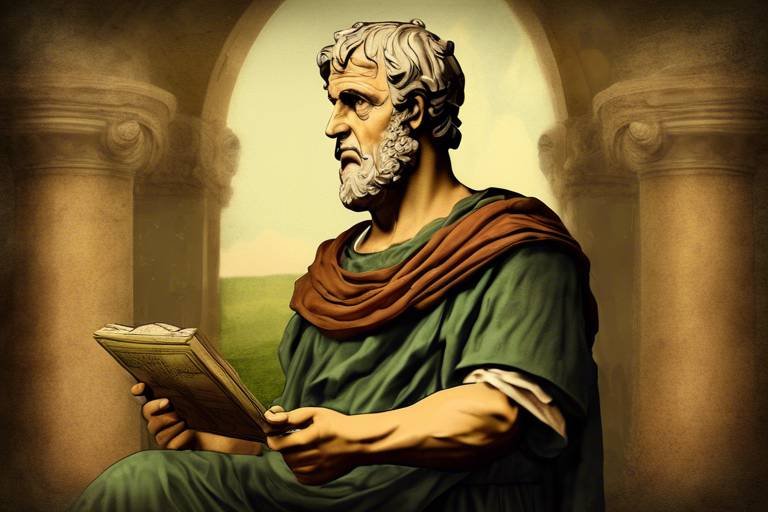Archimedes: The Father of Mathematics
Archimedes, known as the Father of Mathematics, was a brilliant ancient Greek mathematician, physicist, engineer, and inventor who left an indelible mark on the world of science. His groundbreaking contributions in mathematics, physics, and engineering have shaped the way we understand the physical world around us.
From his early life in Syracuse to his education in Alexandria, Archimedes' journey was marked by a relentless pursuit of knowledge and a passion for unraveling the mysteries of the universe. His upbringing and education played a crucial role in shaping his mathematical genius, setting the stage for his remarkable achievements.
One of Archimedes' most renowned principles is his principle of buoyancy, which revolutionized the understanding of objects submerged in water. This principle laid the foundation for fluid mechanics and continues to be a fundamental concept in physics and engineering.
Delving into Archimedes' method of exhaustion reveals his innovative approach to finding the area under a curve, a concept that laid the groundwork for integral calculus centuries before its formal development. His creative thinking and problem-solving skills were truly ahead of his time.
Another marvel of engineering attributed to Archimedes is the Archimedes' screw, a device still used today for lifting water efficiently in irrigation and drainage systems. This invention showcases his practical ingenuity and lasting impact on engineering solutions.
Archimedes' contributions to geometry were profound, with his computation of pi and development of the concept of centers of gravity standing as enduring pillars of mathematical knowledge. His work in geometry continues to inspire mathematicians and scientists to this day.
The Sand Reckoner, one of Archimedes' ambitious works, exemplifies his mathematical prowess and imagination. In this treatise, he attempted to estimate the number of grains of sand that could fit in the universe, demonstrating the vastness of his intellect and curiosity.
Archimedes' influence on modern science is undeniable, with his discoveries resonating across fields such as mathematics, physics, and engineering. His legacy as the Father of Mathematics endures, inspiring generations of scientists and scholars to push the boundaries of knowledge and innovation.
Reflecting on Archimedes' enduring legacy and recognition as a pioneer in the world of mathematics, it becomes clear that his contributions have left an indelible mark on the scientific community. His work continues to shape our understanding of the natural world and serves as a testament to the power of human intellect and curiosity.

Early Life and Education
Explore the life and contributions of Archimedes, the ancient Greek mathematician, physicist, engineer, and inventor. Discover his groundbreaking work in mathematics, physics, and engineering that laid the foundation for many scientific principles still used today.
Archimedes, born in the bustling city of Syracuse in ancient Greece, was nurtured by a family that valued education and intellectual pursuits. His early years were marked by a keen curiosity and a thirst for knowledge that set him apart from his peers. As he grew, he embarked on a journey to Alexandria, the scholarly hub of the ancient world, where he immersed himself in the teachings of renowned mathematicians and philosophers. It was in this vibrant city that Archimedes honed his mathematical skills and developed the innovative thinking that would define his legacy.

Archimedes' Principle
Archimedes' Principle is a fundamental concept in physics that revolutionized our understanding of buoyancy and fluid mechanics. This principle, formulated by the ancient Greek mathematician Archimedes, states that the upward buoyant force exerted on a body immersed in a fluid is equal to the weight of the fluid that the body displaces.
Imagine a ship floating on water – according to Archimedes' Principle, the weight of the water displaced by the ship is equal to the buoyant force that keeps the ship afloat. This principle not only explains why objects float or sink in fluids but also serves as the basis for designing ships, submarines, and other floating vessels.
Archimedes' groundbreaking insight into buoyancy laid the foundation for understanding the behavior of objects in fluids, leading to advancements in naval architecture, hydrodynamics, and various engineering applications. By applying this principle, engineers and scientists can predict the stability and flotation of objects in water, ensuring the safety and efficiency of maritime transportation and marine structures.

Method of Exhaustion
Archimedes' Method of Exhaustion is a groundbreaking mathematical technique that he developed to calculate the area under a curve. This method, dating back over two millennia, laid the foundation for integral calculus. By using a series of inscribed and circumscribed polygons, Archimedes was able to approximate the area of a shape with curved boundaries. This innovative approach allowed him to determine the area of a circle, a feat that was previously considered impossible with traditional geometric methods.
Imagine trying to measure the area enclosed by a curve without the sophisticated tools and formulas we have today. Archimedes' Method of Exhaustion was a stroke of genius that demonstrated his remarkable mathematical insight and problem-solving skills. By breaking down complex shapes into simpler components and progressively refining the approximation, Archimedes paved the way for future advancements in calculus and mathematical analysis.
Archimedes' method was not only revolutionary in the field of mathematics but also had practical applications in various areas. It provided a systematic approach to solving geometric problems that were previously considered unsolvable. This method of exhaustion exemplifies Archimedes' ability to think outside the box and develop innovative solutions to challenging mathematical problems.
Through his Method of Exhaustion, Archimedes showcased his exceptional mathematical prowess and laid the groundwork for the development of integral calculus centuries later. His contribution to the field of mathematics continues to inspire mathematicians and scientists to push the boundaries of knowledge and explore new frontiers in mathematical theory and application.

Archimedes' Screw
Archimedes' Screw is a remarkable invention attributed to the ancient Greek mathematician, physicist, and engineer, Archimedes. This ingenious device, also known as the Archimedean screw, is a simple yet effective mechanism designed for lifting water for irrigation and drainage purposes. The screw consists of a helical surface wrapped around a shaft, forming a spiral tube. When the device is rotated, water is drawn up the spiral tube and discharged at a higher level.
One of the key advantages of Archimedes' Screw is its ability to efficiently move water against gravity without the need for complex machinery or power sources. This innovation revolutionized the process of water transportation and distribution in ancient times, providing a practical solution for various agricultural and industrial applications.
Additionally, the design of the Archimedes' Screw showcases Archimedes' profound understanding of physics and engineering principles. By harnessing the power of simple mechanics and the properties of fluids, Archimedes was able to develop a solution that significantly improved water management systems during his era.

Archimedes' Contributions to Geometry
Explore the life and contributions of Archimedes, the ancient Greek mathematician, physicist, engineer, and inventor. Discover his groundbreaking work in mathematics, physics, and engineering that laid the foundation for many scientific principles still used today.
Archimedes made significant contributions to the field of geometry that have had a lasting impact on mathematical understanding. One of his most famous achievements was the accurate computation of pi, the ratio of a circle's circumference to its diameter. Through his innovative methods, Archimedes was able to approximate pi with remarkable precision, laying the groundwork for further advancements in mathematical theory.
In addition to his work on pi, Archimedes also developed the concept of centers of gravity, pioneering the study of geometric figures' equilibrium and stability. By determining the center of mass of various shapes, Archimedes provided essential insights into the principles of balance and symmetry, which are fundamental in both mathematics and physics.
Furthermore, Archimedes' geometric investigations extended to the realm of solid geometry, where he explored the properties of spheres, cones, and cylinders. His discoveries in this area not only expanded the understanding of three-dimensional shapes but also influenced the development of calculus and integral geometry in later centuries.
Overall, Archimedes' contributions to geometry transcend mere calculations and formulas; they represent a profound exploration of the fundamental principles that govern spatial relationships and mathematical structures, shaping the very essence of geometric reasoning and analysis.
- What were Archimedes' most famous inventions?
- How did Archimedes impact the field of mathematics?
- What is the significance of Archimedes' principle in physics?
- Why is Archimedes considered the Father of Mathematics?

The Sand Reckoner
Archimedes' work "The Sand Reckoner" is a testament to his extraordinary mathematical mind and boundless imagination. In this ambitious piece, he set out to estimate the total number of grains of sand that could potentially fill the entire universe. This endeavor was not merely a whimsical exercise but a demonstration of Archimedes' prowess in handling incredibly large numbers and pushing the boundaries of mathematical calculation.
To tackle this monumental task, Archimedes devised a system of notation that allowed him to represent and manipulate numbers far beyond the scope of conventional Greek mathematics at the time. He introduced a method of denoting numbers using a myriad of symbols, enabling him to express quantities in the order of tens of thousands and even beyond.
By contemplating the vastness of the cosmos and the sheer abundance of grains of sand that could populate it, Archimedes showcased his ability to think on a grand scale and grapple with concepts that transcended the confines of everyday perception. This exercise not only highlighted his mathematical acumen but also underscored his willingness to explore the uncharted territories of theoretical inquiry.

Archimedes' Influence on Modern Science
Archimedes' Influence on Modern Science is profound and far-reaching, transcending centuries to shape the very fabric of scientific inquiry. His groundbreaking discoveries in mathematics, physics, and engineering continue to reverberate through modern scientific thought, inspiring researchers and innovators worldwide.
One of the key areas where Archimedes' influence is unmistakable is in the field of mathematics. His work on geometry, including his computation of pi, laid the foundation for geometric principles still used today. The concept of centers of gravity, developed by Archimedes, has applications in various scientific disciplines, from architecture to aerospace engineering.
In the realm of physics, Archimedes' contributions are equally significant. His principle of buoyancy, which explains the behavior of objects submerged in fluids, remains a cornerstone of fluid mechanics. This principle has practical applications in diverse fields, from naval architecture to the design of submarines.
Furthermore, Archimedes' engineering ingenuity is evident in inventions such as the Archimedes' screw. This device, designed to lift water efficiently for irrigation and drainage purposes, showcases his practical approach to solving real-world problems. The legacy of his engineering marvels can be seen in modern technologies that continue to improve the quality of life.
Archimedes' influence on modern science extends beyond his specific discoveries to encompass his approach to inquiry and problem-solving. His method of exhaustion, a precursor to integral calculus, exemplifies his innovative thinking and analytical prowess. By pushing the boundaries of mathematical and scientific knowledge, Archimedes set a standard for rigorous investigation that continues to inspire scientists today.
In conclusion, Archimedes' impact on modern science is immeasurable, with his legacy enduring as a testament to the power of human intellect and curiosity. By exploring his contributions, we gain insight into the foundational principles that underpin contemporary scientific thought, reminding us of the enduring relevance of his work in shaping the world we inhabit.

Legacy and Recognition
Archimedes' legacy as the Father of Mathematics is unparalleled in the history of science. His remarkable contributions have left an indelible mark on the fields of mathematics, physics, and engineering, shaping the way we understand the world around us. Recognized for his brilliance and innovation, Archimedes' work continues to inspire generations of scientists and scholars, serving as a beacon of intellectual excellence.
Throughout the centuries, Archimedes' discoveries have been celebrated for their profound impact on modern science. His pioneering concepts in mathematics, such as the computation of pi and the development of centers of gravity, laid the groundwork for future advancements in the field. His method of exhaustion, a precursor to integral calculus, demonstrated his exceptional analytical skills and mathematical ingenuity.
One of Archimedes' most enduring inventions, the Archimedes' screw, remains a testament to his engineering prowess. This simple yet effective device, used for lifting water for irrigation and drainage purposes, showcases his practical approach to problem-solving and his ability to innovate in diverse fields.
Archimedes' influence extends far beyond his own time, with his work continuing to shape the way we approach scientific inquiry. His principle of buoyancy and fluid mechanics revolutionized our understanding of objects submerged in water, leading to advancements in shipbuilding and hydrodynamics. His ambitious work in estimating the number of grains of sand in the universe, as detailed in "The Sand Reckoner," exemplifies his boundless imagination and mathematical acumen.
In conclusion, Archimedes' legacy and recognition as the Father of Mathematics stand as a testament to his unparalleled intellect and enduring impact on the world of science. His contributions have not only enriched our understanding of the natural world but have also inspired countless individuals to push the boundaries of knowledge and innovation.
Frequently Asked Questions
- Who was Archimedes?
Archimedes was an ancient Greek mathematician, physicist, engineer, and inventor known for his significant contributions to various fields of science and mathematics.
- What is Archimedes' Principle?
Archimedes' Principle is a fundamental concept in physics that explains the buoyant force experienced by an object immersed in a fluid, stating that the upward buoyant force is equal to the weight of the fluid displaced by the object.
- What is the Method of Exhaustion?
The Method of Exhaustion was an innovative mathematical technique developed by Archimedes to calculate the area under a curve, laying the groundwork for integral calculus centuries before its formal development.
- How did Archimedes influence modern science?
Archimedes' discoveries and inventions have had a lasting impact on various scientific fields, including mathematics, physics, and engineering, inspiring advancements and serving as a foundation for many modern scientific principles.
- What is the significance of Archimedes' Screw?
The Archimedes' screw is an ancient device designed by Archimedes for lifting water efficiently, still used today for irrigation and drainage purposes, showcasing his engineering ingenuity and practical contributions to society.



















